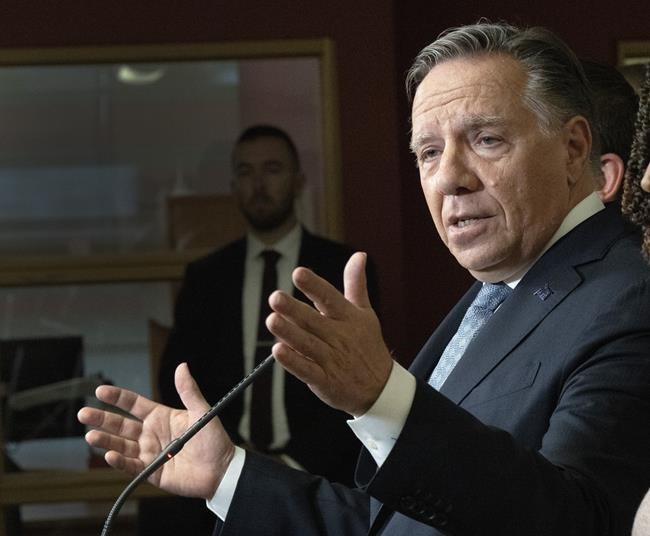
Coalition Avenir du Quebec Leader Francois Legault speaks to the media while campaigning In Longueuil, Que., Monday, Sept. 19, 2022. The incumbent premier is starting the day in the Orford riding. THE CANADIAN PRESS/Ryan Remiorz
Republished September 20, 2022 - 2:33 PM
Original Publication Date September 20, 2022 - 1:06 AM
MONTREAL - Quebec's governing Coalition Avenir Québec is benefiting from an almost even split among its four main opponents, according to a Leger poll released Tuesday.
The survey, published by Le Journal de Montréal, has the Quebec Liberal Party, the Conservative Party of Quebec and Québec solidaire tied at 16 per cent, with the Parti Québécois close behind at 13 per cent.
Support for the CAQ — at 38 per cent — is more than double that of its closest rivals.
Liberal Leader Dominique Anglade said the poll shows that more than 60 per cent of Quebecers don't want François Legault's CAQ to be re-elected, adding that voters should rally behind her party to prevent him from winning.
"I'm not calling for strategic voting. I'm calling for a coming together, for a joining of forces ... but it's more than that. Go out and vote," Anglade told reporters in Montreal. "We saw what happened in Ontario."
In June, Doug Ford's Progressive Conservatives captured 41 per cent of the popular but won 67 per cent of the seats in the Ontario legislature. And voter turnout sunk to a record-low 43 per cent.
Anglade insisted she is not conceding defeat. "I'm asking myself, is (a CAQ government) what we want? And the response, we know, is no. We know that more than 60 per cent of people don't want that. So, what will we do collectively as Quebecers?"
The poll shows support for the Liberals down two percentage points from a Leger survey conducted earlier in the month.
Legault responded to Anglade's call during a campaign stop in Lac-Mégantic, Que., near the province's border with the United States.
“Once again, Ms. Anglade is looking at things negatively. What I’m trying to do is explain to Quebecers why they should vote for the CAQ -- not strategically (but) because we have the best platform, because we have the best team,” he told reporters.
Québec solidaire spokesman Gabriel Nadeau-Dubois said he thinks it's too early to talk about strategic voting. "There's still a debate, there's still two weeks in the campaign," he told reporters during a campaign stop in Montreal.
"We're on the offence; we're here to make gains, and we're in position to make them."
His party is down one percentage point from the last Leger poll — but Tuesday's result is the second-best performance for Québec solidaire in a Leger poll since 2018.
Meanwhile, Conservative Leader Éric Duhaime said he thinks the polls may underestimate support for his party and that the real test will be who can get out the vote. Duhaime said he was happy the newest Leger poll had his party with more than 15 per cent support for the first time since he was elected leader.
Daily polls conducted by Mainstreet Research, meanwhile, have consistently shown the Conservatives in second place — with support at nearly 20 per cent — though that firm's model suggests the Conservatives won't win any of the legislature's 125 seats.
Duhaime, however, said the Conservatives stand to benefit from a "voting booth boost." Voters, he said, may be shy to tell pollsters that they are voting Conservative because the party has been "demonized" in the public sphere. But those voters may choose his party in the privacy of a voting booth, he added.
"What will be important, ultimately, is getting out the vote, because voting intentions are one thing, but the votes that count are not the polls — what counts is ballots in the ballot boxes," he told reporters in St-Georges, Que., south of Quebec City. "Our challenge is really to get out the vote and that's how we think we will win."
Quito Maggi, the president and CEO of Mainstreet Research, said that his firm's model doesn't currently project the Conservatives winning a seat, but the party appears very competitive in five or six ridings.
While different polls have had slightly different results, most of those differences are within the margin of error and show similar trends, Maggi said in an interview Tuesday. All of them show the CAQ on track for a "massive win" as it benefits from a divided opposition, he added.
"All of those splits are giving them an absolutely devastating advantage, very, very similar to what we saw happen in Ontario earlier this year, where the Liberals and NDP were splitting the vote everywhere," Maggi said.
Parti Québécois Leader Paul St-Pierre Plamondon, whose party was up two percentage points from the previous Leger poll, didn't directly respond when asked whether the PQ's rise is coming too late in the campaign. He said he doesn't plan to make changes in his party's strategy.
"We're running the campaign we wanted to run: an authentic campaign on the issues that are essential for the future," he told reporters in Tadoussac, Que., northeast of Quebec City.
Leger used its online panel to survey 1,046 Quebec residents 18 and older, between Sept. 16-18. The poll can't be assigned a margin of error because respondents were not selected randomly.
This report by The Canadian Press was first published Sept. 20, 2022.
— With files from Frédéric Lacroix-Couture and Stéphane Rolland.
News from © The Canadian Press, 2022